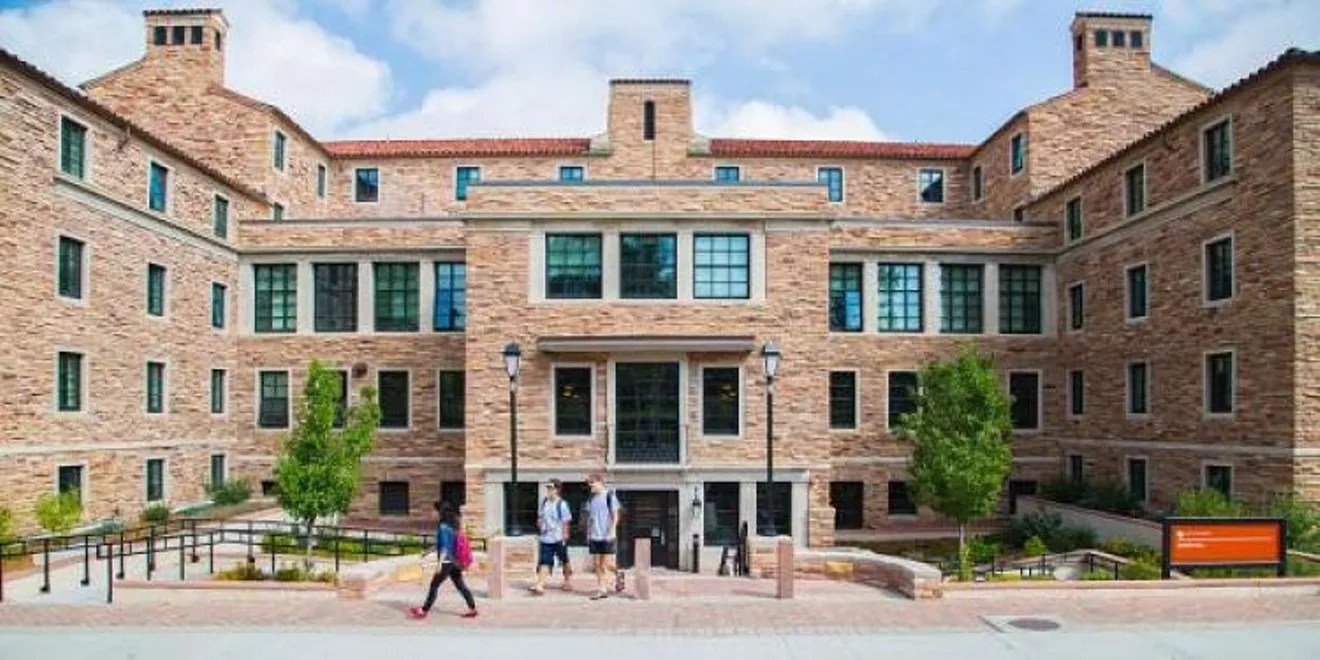
colorado.edu

Audio By Carbonatix
Current and former students of the University of Colorado who were enrolled at one of the school’s four campuses during the spring semester of 2020 can expect some extra cash this summer.
The university will be cutting checks as a result of a $5 million class-action lawsuit settlement that accused CU of breaching its contract with students by charging fees during the COVID-19 pandemic for services it didn’t provide. Eligible students from CU Boulder can expect to receive $102; $58 will go to CU Denver students; $37 goes to students from CU’s Colorado Springs campus (UCCS); and students at the Anschutz Medical Campus will get a whopping $12, according to Igor Raykin, one of the attorneys representing the plaintiffs in the suit.
News of their payday was delivered by email late last month with the subject line “CU Covid Refund – Notice of Proposed Class Action Settlement.”
According to the email, plaintiffs of the lawsuit “alleged the University breached a contract when it transitioned to remote learning in response to the COVID-19 pandemic.” Plaintiffs also “alleged that the University’s shift to remote learning gave rise to claims of unjust enrichment.
“Plaintiffs sought a refund of a portion of their tuition and fees for the Spring 2020 semester,” the email continues. “The University denies all allegations of wrongdoing, and there has been no finding of liability in any court. However, considering the interests of both the University and its students in prompt resolution of the matter, the University and Plaintiffs have agreed that the University will pay $5,000,000 into a Settlement Fund to resolve the Action.”
According to cucovidsettlement.com, which offers additional information about the lawsuit, people receiving money can opt out of the settlement and preserve any individual legal claims they may have against CU related to the transition to online school in 2020. Otherwise, that $5 million fund will be divided up and distributed to thousands of CU students by check or through an online payment vendor such as PayPal.
Considering that the group set to receive this money is largely comprised of pandemic dropouts, recent college grads and soon-to-be graduates, news of the summer payday is sure to lead to cheers – and ideas on how to spend the cash.
Here are Westword‘s suggestions for what settlement class members could do with the extra dough, even if it’s just $12:
CU Denver ($58): A Pretty Long Scooter Ride
New high-tech Lyft scooters hit the streets this week. A CU Denver student could afford to ride one of those bad boys for approximately 154 minutes at 37 cents per minute (minus a $1 unlock fee).
With a max speed of fifteen miles per hour, that’s 38.5 miles – enough to get you to CU’s Folsom Field for our next suggestion.
CU Boulder ($102): A Ticket to See Deion
While single game tickets technically aren’t on sale yet for the Buffaloes’ upcoming football season, the ticket office says that it expects entry to cost between $75 and $150 on average this season. With the team now under the leadership of NFL Hall of Famer Deion Sanders, the Buffs will likely be one of the most exciting sports teams to watch in Colorado – if not the nation.
Despite winning a national championship in 1990, the program has a notorious track record for poor performance as of late, but Sanders and his star quarterback son, Shedeur, hope to turn everything around.
More than 47,000 people showed up to watch the team’s spring practice game in Boulder, and CU has managed to record its first complete sellout of season tickets since 1996 – and only ninth of all time, according to the Buffs’ official website.
The first home game is coming up on September 9 against Nebraska, and will be well worth putting $102 toward.
CU Colorado Springs ($37): Cheyenne Mountain Zoo
The most expensive ticket to the Colorado Springs Cheyenne Mountain Zoo (adult, summer weekends) is $34.75. The typical cost of a lettuce wrap to feed to a purple-tongued giraffe is $3.
Don’t have an extra $1 to spend? Head to the zoo on a weekday, when adult tickets are just under $30.
For those who don’t know, the Cheyenne Mountain Zoo has been around since 1926 and is considered one of the best zoos in the country. The facility provides many opportunities for up-close animal encounters; visitors can feed elephants, rhinos, tropical birds and more, in addition to the giraffe experience. There is truly nothing better to spend $37 on in Colorado Springs.
Anschutz Medical Campus ($12): Pre-Game $3 Beers at Coors Field
While it would not be worth spending your hard-earned class-action lawsuit money on Colorado Rockies tickets for the purpose of actually watching the team right now, spending the money on the country’s cheapest baseball beers could be worthwhile.
As long as you’re there before the first pitch, the Rooftop deck at Coors Field serves 12-ounce drafts of Coors and Coors Light for $3 a pop – and 16-ounce craft beers for $6!
That’s enough for an Anschutz settlement class member to guzzle down at least four silver bullets or a pair of Blue Moon tallboys. If you factor in the cost of a ticket, which goes for as little as $6 some games, an Anschutz student could still afford at least two drafts or one tallboy. But then you’d have to watch the Rockies relatively sober.